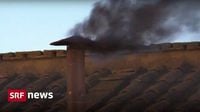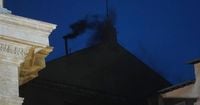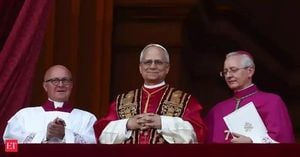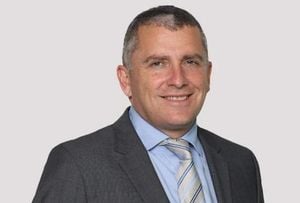On Wednesday evening, May 7, 2025, black smoke billowed from the chimney of the Sistine Chapel, signaling that the Cardinals had not reached a consensus on a new Pope during the first round of voting. This marks the beginning of a conclave that will determine the successor to the late Pope Francis, who passed away on Easter Monday. The election process, steeped in tradition, will continue privately as the world awaits further developments.
The conclave officially commenced at 17:50, after the doors of the Sistine Chapel were closed, ensuring that the 133 Cardinals could deliberate without outside interference. These Cardinals, representing a diverse spectrum of the Catholic Church, are tasked with selecting the 267th Pope in history—a decision that is anticipated to be made by the end of the week, although no guarantees can be made.
According to the Italian news agency Ansa, around 30,000 people gathered in St. Peter's Square to witness the smoke signal after the first ballot. By evening, this number swelled to approximately 45,000, all eager for the telltale signs of either black or white smoke, which indicate the outcome of the voting. As tradition dictates, white smoke signals a successful election, while black smoke indicates that no candidate has secured the requisite two-thirds majority—89 votes in this case.
As the hours passed, anticipation grew among the crowd. The first ballot was conducted around 17:30, and the smoke signal was expected between 19:00 and 20:00. However, the first indication of the Cardinals’ decision did not appear until 21:00, leading to a palpable sense of disappointment among those gathered. The delay prompted a few light-hearted moments, including laughter when an airplane left white contrails against the sky, momentarily confusing onlookers.
During the solemn proceedings, the Cardinals took an oath of secrecy at 17:18, pledging to maintain confidentiality regarding the discussions and decisions made during the conclave. The atmosphere is further heightened by the absence of electronic devices, as all phones and digital gadgets were surrendered prior to the conclave's commencement. The Cardinals will reside at the Vatican guesthouse Santa Marta, a short distance from the chapel, throughout the election process.
As the night wore on, speculation about potential candidates continued to swirl. Notably, discussions have emerged regarding the possibility of an African Pope, a significant consideration given the growing influence of the African church. Cardinal Gerhard Ludwig Müller, one of the German Cardinals participating in the conclave, mentioned he had packed for a stay of five to six days, indicating the potential length of the deliberations.
Looking ahead, the conclave is set to continue on Thursday, May 8, with up to four ballots scheduled—two in the morning and two in the afternoon. The Cardinals will reconvene shortly after the morning Mass, which is traditionally held to invoke divine guidance for their decision. Should the Cardinals fail to elect a new Pope after the first round of voting on Thursday, the process will repeat until a candidate secures the necessary majority.
In a light-hearted moment, a Bavarian comedian impersonated a key warden on St. Peter's Square, joking about the different types of smoke that could emerge from the chapel. This comedic interlude provided a brief distraction from the serious nature of the proceedings.
As the world watches, the anticipation surrounding the election of a new Pope remains high. The new leader will not only guide the 1.4 billion Catholics worldwide but will also represent the Catholic Church in an increasingly complex global landscape. Observers are particularly curious about the direction the new Pope will take, especially in light of the challenges faced by the Church today.
With the public eagerly awaiting the next smoke signal, the Cardinals prepare for another day of voting, hoping to reach a consensus that will usher in a new era for the Catholic Church. As the clock ticks and the world holds its breath, the outcome of this conclave remains uncertain, but one thing is clear: the significance of this moment in history is profound.
As discussions continue behind closed doors, the eyes of millions are fixed on the Vatican, where the future of the Catholic Church hangs in the balance. The next few days will be pivotal, not only for the Church but for the faithful around the globe, who look to their leaders for guidance and hope in challenging times.





